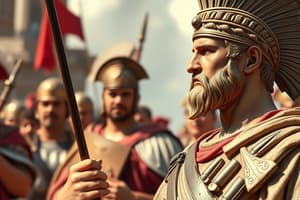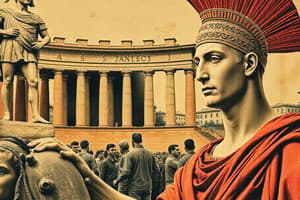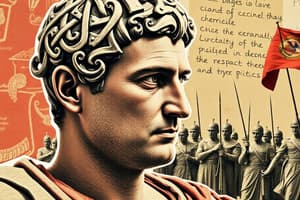Podcast
Questions and Answers
Who were Julius Caesar's parents?
Who were Julius Caesar's parents?
Gaius Octavius and Aurelia
What did Caesar study as a young man?
What did Caesar study as a young man?
Rhetoric and law
Which political factions did Caesar support in his early career?
Which political factions did Caesar support in his early career?
Populares and Optimates
What were Caesar's most famous campaigns against?
What were Caesar's most famous campaigns against?
In which year was Caesar elected as one of Rome's two consuls?
In which year was Caesar elected as one of Rome's two consuls?
In what year did Caesar form the First Triumvirate?
In what year did Caesar form the First Triumvirate?
What modern-day countries were included in Caesar's conquest of Gaul?
What modern-day countries were included in Caesar's conquest of Gaul?
Who led the group of senators that assassinated Caesar?
Who led the group of senators that assassinated Caesar?
Who emerged as the most powerful figure in the Second Triumvirate?
Who emerged as the most powerful figure in the Second Triumvirate?
Who succeeded Octavian as the ruler of the Roman Empire?
Who succeeded Octavian as the ruler of the Roman Empire?
Flashcards are hidden until you start studying
Study Notes
Julius Caesar: A Fascinating Journey Through the Life of a Roman statesman and Military Genius
Julius Caesar, born Gaius Octavius in 100 BCE, was arguably one of the most influential figures in the history of the Roman Republic. As a statesman, military genius, and founder of the Caesar dynasty, Caesar's life is a testament to the turbulent political climate of ancient Rome.
Early Life and Family Connections (100-60 BCE)
Caesar was born in Rome, the son of a prominent nobleman, Gaius Octavius, and his wife, Aurelia. His paternal grandfather, Gaius Octavius, was an influential figure in Roman politics, while his maternal grandfather, Marcus Aurelius Scaurus, was a successful statesman and lawyer. These connections provided Caesar with a strong foundation for his future political career.
As a young man, Caesar studied rhetoric and law under the tutelage of prestigious teachers such as Marcus Antonius and Quintus Mucius Scaevola. His intelligence and charisma quickly became apparent, setting him on a path to pursue a political career.
Political Career and Military Success (60-44 BCE)
Caesar's early political career was marked by steady advancement. He supported various political factions, such as the Populares and the Optimates, and eventually found his way into the inner circle of the powerful Marius and Cinna families.
In 60 BCE, Caesar was elected as one of Rome's two consuls. During his time as consul, he was responsible for a series of military campaigns that helped to consolidate his status as a leading military strategist. Caesar's most famous campaigns were against the Helvetii, a Celtic tribe seeking to migrate across Roman territory. Caesar's swift and decisive actions prevented the Helvetii from crossing the Roman border, earning him acclaim and solidifying his reputation as a skilled commander.
Caesar's military prowess was further demonstrated during the First Triumvirate, a political alliance formed between Caesar, Pompey, and Crassus in 60 BCE. This alliance allowed Caesar to pursue a series of successful military campaigns, which included the conquest of Gaul (modern-day France, Belgium, and parts of Germany) between 58 and 51 BCE.
Caesar's conquest of Gaul was one of his most significant accomplishments. He brought large areas of the region under Roman control, defeated numerous Gaulish tribes, and demonstrated a remarkable ability to adapt and innovate in the face of challenging military situations.
The Rise of the Caesars (44-27 BCE)
Caesar's political career took a dramatic turn in 44 BCE, when he was assassinated by a group of senators led by Brutus and Cassius. Caesar's death sparked a power struggle between the Second Triumvirate, a political alliance formed between Mark Antony, Lepidus, and Octavian, Caesar's designated heir.
Octavian, later known as Augustus, rose to prominence as the most powerful figure in the Second Triumvirate. With the support of Mark Antony and Lepidus, Octavian emerged victorious in numerous civil wars, effectively consolidating his power and position as Rome's first emperor.
Octavian's reign marked the beginning of the Caesar dynasty, which lasted for centuries. He was succeeded by his adopted son, Tiberius, and his grandson, Caligula, who continued the Caesar dynasty's rule over the Roman Empire.
Legacy and Influence (27 BCE - Present)
Julius Caesar's contributions to the Roman Republic and the Roman Empire are numerous and far-reaching. His military and political achievements laid the foundation for the Roman Empire as we know it today. As a military genius, he demonstrated a remarkable ability to adapt and innovate in the face of challenging military situations. As a statesman, he helped to form the political landscape that facilitated the rise of the Caesar dynasty.
Caesar's influence can be seen in the many monuments, statues, and architectural structures dedicated to him throughout Rome. His image continues to be celebrated in art, literature, and popular culture, reflecting the enduring impact of his life and achievements.
In conclusion, Julius Caesar's life is a testament to the turbulent political climate of ancient Rome. His military and political achievements, as well as his influence on the Roman Empire, continue to be celebrated and studied by historians and enthusiasts alike. Caesar's life is a fascinating journey through the world of ancient Rome, a world that remains a source of endless fascination and intrigue.
Studying That Suits You
Use AI to generate personalized quizzes and flashcards to suit your learning preferences.




